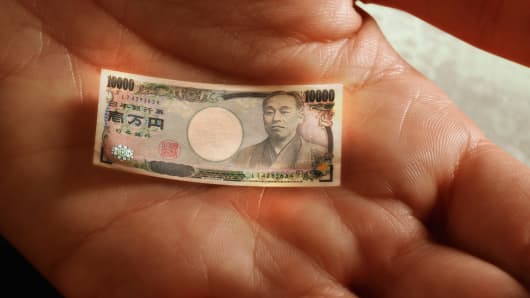The Japanese yen fell to a two-year low on Thursday, continuing its rapid downtrend that started in the middle of last month when new Prime Minister Shinzo Abe first promised to aggressively ease monetary policy.
But analysts warn that the yen could reverse direction and end up firmer by the end of 2013 as the U.S. Federal Reserve will stay ahead of the Bank of Japan (BOJ) in monetary easing, which means the dollar will fall at a more rapid pace than the yen.
According to Sean Callow, senior currency strategist with Westpac Bank in Sydney, it is merely a matter of time before the yen climbs back up. He forecasts the currency will strengthen to 79 against the dollar from the current 85 levels by the end of 2013 because the moves by the BOJ will not be aggressive enough to counter safe-haven flows.
"Expectations have been raised so high that we will see very aggressive action from BOJ," Callow said. "But the BOJ has always been cautious in monetary easing. The Fed tends to take action immediately and far more aggressively. We think that the Fed will win the battle of the balance sheet."
Abe, who was sworn in for a second time as Japan's premier on Wednesday, wants the central bank to increase its inflation target from the current 1 percent to 2 percent, prompting hopes that the new government will finally usher in an era of a weak yen and drive an export-led recovery in the world's third-largest economy.
(Read more: Just How Low Will the Yen Go?)
The currency has been a favored destination for safe-haven flows amid uncertainties in the U.S. and euro zone. The "unlimited" easing by the Fed has also driven investors to the yen despite five moves this year by the BOJ to expand its asset-buying program including the most recent one on December 20.
The yen, which has fallen 8 percent since November 15, had not reacted much to the BOJ's earlier moves which saw its asset-purchase program expanded to 91 trillion yen ($1.07 trillion).
"We certainly expect further easing by BOJ sometime next year but it will not be sufficient," Callow said. "So there's scope for some pretty substantial disappointment over the next 12 months or so."
(Read more: Is Bank of Japan Already Dancing to Abe'sTune?)
The inflation rate in Japan has averaged zero percent over the past 20 years, and it won't be easy to turn around 20 years of flat prices, according to Callow.
"The inflation target is just not very plausible," he added.
David Greene, senior corporate forex dealer with Western Union Business Solutions in Sydney, also expects the yen to strengthen by the end of next year, to about 82 to the greenback. He thinks that continued economic uncertainties in the U.S. and Europe will drive flows to the yen.
(Read more: Euro Zone Rescuer Draghi Faces Daunting 2013)
"I think there will be some risk events in 2013 that will see a flight to safety and ultimately this is what will underpin the yen," Greene said. "The U.S. 'fiscal cliff' is imminent; the picture in the euro zone could potentially play havoc with markets. The alternative for investors would be to seek safety in other Asian currencies."
The U.S. Congress is yet to come to a compromise to avoid the "fiscal cliff" - a series of spending cuts and tax increases which will kick in on January 1 and could lead the country into a recession, while the euro zone is reeling under negative economic growth.
—By CNBC's Jean Chua


